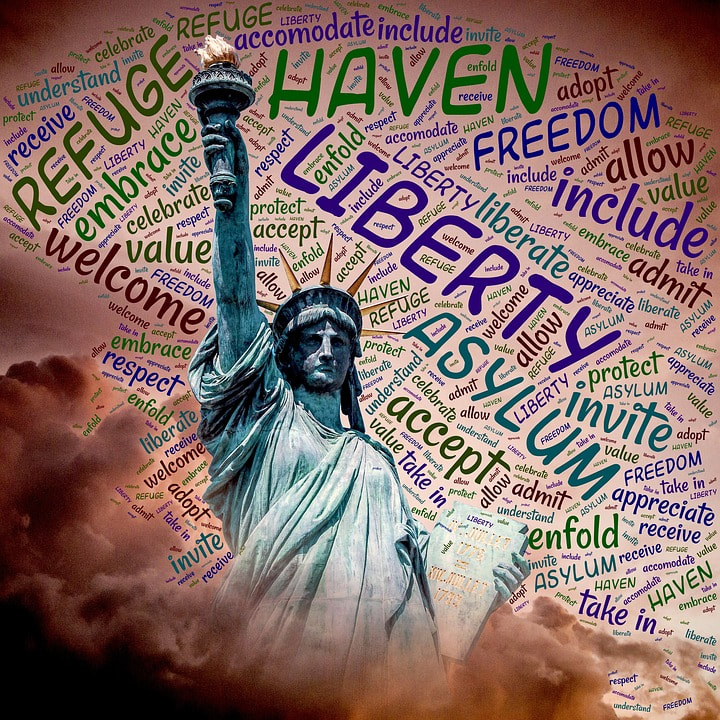I have a granddaughter who will be two years old in mid-July. Given what has happened on our southern border, I can’t help but to imagine what it would be like to have her ripped from my arms by some burly border guard. My heart breaks at the thought of seeing her deep brown eyes look at me for help and for answers as she begins to kick and cry because a stranger is grabbing her from the comforting arms of her pop-pop. I imagine that I begin to cry as I am marched away in handcuffs and I hear her voice – and only her voice – pierce through the cacophony of sobbing children and barking officials as she cries and struggles to get free. I further imagine that I am frightened and humiliated and angry all at the same time. I can’t protect this precious child. I can’t predict what will happen to her. I am the person she looks to for comfort and safety and I have failed her.
I have a good imagination and using it to better understand the brutish tactics our government has taken with immigrants on our border is an exercise I recommend to all. It is only by putting ourselves in the place of others that we begin to better understand the depth of these callous actions forced upon children and families. By using our imaginations to place our loved ones in harm’s way we can see these actions as a personal affront, as an assault on our loved ones, as a threat to the very core of who we are as a people. By using our imaginations in this way – the atrocity on our southern border becomes very personal. It is no longer about them. It is now about us. In years past, we could see that immigrant families were just like us: they wanted what we want. They yearned for a better life. They wanted good schools and safe streets for their children. They wanted work that will allow them to live with dignity. They still want these things, but now the dynamic has changed and has a deadly undertone. According to a new Brookings report, many of the families showing up at our southern borders are fleeing violence. As stated in the report, “More than 40 percent had a relative who was killed in the past two years. Thirty-one percent knew someone who was kidnapped; 17 percent knew someone who disappeared.” Knowing this makes our government's actions even more obscene. It would behoove us to gain a better understanding of the unauthorized immigrant population in America. The Migration Policy Institute provides a helpful profile of the 11 million unauthorized immigrants currently in the country. Surprisingly – 58% have lived here for ten years or more. The majority are working (64%), have a high school education or better (50%) and many own a home (31%). Contrary to some opinions – unauthorized immigrants contribute more to the national economy than they take out. This makes sense when you think about it. The majority are working and paying taxes, yet they are ineligible for most public benefits such as welfare or food stamps. Even more astounding, the Social Security Administration estimates that unauthorized immigrants are contributing billions of dollars into Social Security every year, with little hope of ever recouping those funds because they are not allowed to receive them. And so the facts tell us that all immigrants provide a net gain to the American economy, including those who are unauthorized. Our imaginations and our values tell us that the actions our government is taking on the border are an affront to our sense of decency and humanity, especially in the face of the violence they are fleeing from. You wouldn’t know it from the rhetoric, but an astounding 75% of Americans think immigration helps our country, as evidenced in a couple of recent public opinion polls. Thomas Jefferson said that the government you elect is the government you deserve. Is that true? Do we deserve this government that debases adults and separates children from their mothers? Do we deserve a government that – time and again – offers up policies that are contrary to our history and our values? America is a country of immigrants. Nearly every person in this country today can trace their roots to a desperate ancestor who braved an immigrant journey to these shores seeking a better way of life (except for those who came her in slave ships). My paternal grandparents came here in the early 1900s from western Ukraine. My maternal grandparents came at about the same time from the region around Naples, Italy. I am only here because of them. In that respect – I am an immigrant. We are all immigrants. We are all just “strangers and guests” in this world. And, we should demand better. Comments are closed.
|
AuthorMike Soika has been a community activist for more than 30 years working on issues of social and economic justice. His work for justice is anchored by his spiritual formation first as a Catholic and now as a Quaker. Pre 2018 Archives
|


 RSS Feed
RSS Feed
